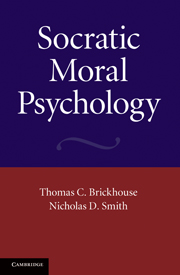Book contents
- Frontmatter
- Contents
- Acknowledgments
- Introduction
- 1 Apology of Socratic studies
- 2 Motivational intellectualism
- 3 The “prudential paradox”
- 4 Wrongdoing and damage to the soul
- 5 Educating the appetites and passions
- 6 Virtue intellectualism
- 7 Socrates and his ancient intellectual heirs: Plato, Aristotle, and the Stoics
- Appendix: is Plato's Gorgias consistent with the other early or Socratic dialogues?
- Bibliography
- Index of passages
- General index
3 - The “prudential paradox”
Published online by Cambridge University Press: 04 August 2010
- Frontmatter
- Contents
- Acknowledgments
- Introduction
- 1 Apology of Socratic studies
- 2 Motivational intellectualism
- 3 The “prudential paradox”
- 4 Wrongdoing and damage to the soul
- 5 Educating the appetites and passions
- 6 Virtue intellectualism
- 7 Socrates and his ancient intellectual heirs: Plato, Aristotle, and the Stoics
- Appendix: is Plato's Gorgias consistent with the other early or Socratic dialogues?
- Bibliography
- Index of passages
- General index
Summary
INTRODUCTION
The prudential and moral paradoxes
Of the many paradoxical positions attributed to Socrates in Plato's early dialogues, two are perhaps most closely associated with the philosopher. The first is the “prudential paradox,” which states that no one ever acts contrary to his knowledge of what is best for him or even contrary to a concurrently held all-things-considered belief about what is best for him, and the second is the “moral paradox,” according to which no one voluntarily does what is unjust. Seeing why Socrates would have held these positions in spite of their obvious conflict with common sense will allow us to understand better a number of issues at the heart of the ethical epistemology and psychology we find in Plato's early dialogues and to deepen our understanding of that philosophy. Because the moral paradox depends crucially on the prudential, we shall focus in this chapter on the prudential paradox, and will turn to the moral paradox in the next chapter.
The prudential paradox
The best-known attribution of the prudential paradox to Socrates outside the pages of Plato can be found in Aristotle's Nicomachean Ethics:
Some say that if he has knowledge of how to act rightly, he cannot be akratic; for, as Socrates thought, it would be strange for a man to have knowledge and yet allow something else to rule him and drag him about like a slave. For Socrates was entirely opposed to this view and held that there is no such thing as akrasia; for he thought that no one with the right belief does what is contrary to the best, but if a man does so, it is through ignorance.[…]
- Type
- Chapter
- Information
- Socratic Moral Psychology , pp. 63 - 88Publisher: Cambridge University PressPrint publication year: 2010



